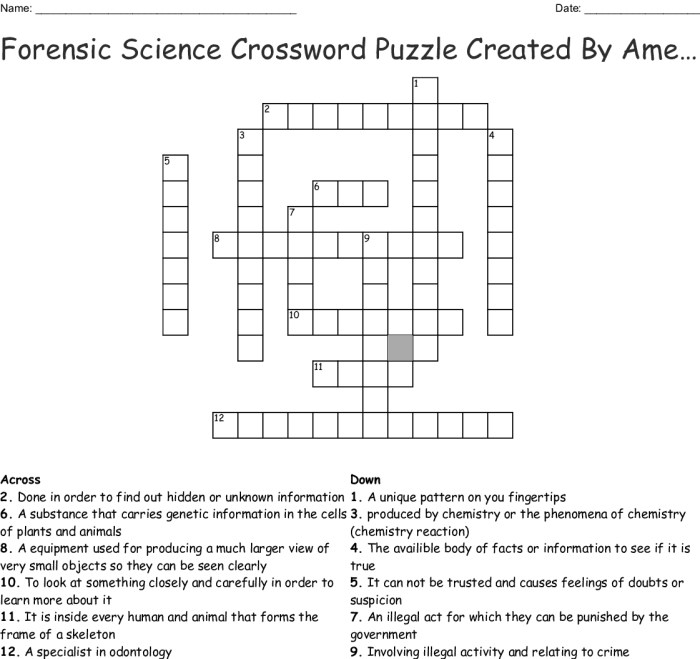Answers for science crossword puzzles unlock a world of scientific knowledge, where wordsmiths and science enthusiasts collide. From the enigmatic depths of chemistry to the celestial expanse of astronomy, science crossword puzzles present a tantalizing challenge that captivates minds and expands horizons.
This comprehensive guide delves into the intricate world of science crossword clues, revealing strategies for deciphering their enigmatic language and unearthing the hidden gems of scientific vocabulary.
Crosswords

Crosswords are word puzzles that typically take the form of a square or rectangular grid of black and white squares. The goal of a crossword puzzle is to fill the white squares with letters, forming words or phrases, by solving clues that lead to the answers.
The black squares are used to separate the words and phrases.Crosswords typically have two types of clues:
- Across clues: These clues are numbered and read from left to right.
- Down clues: These clues are numbered and read from top to bottom.
The clues can be of various types, including:
- Definition clues: These clues simply define the answer.
- Synonym clues: These clues provide a synonym for the answer.
- Antonym clues: These clues provide an antonym for the answer.
- Homophone clues: These clues use words that sound the same but have different meanings.
- Anagram clues: These clues provide a scrambled version of the answer.
Crosswords have a long history, dating back to the early 1900s. The first crossword puzzle was published in the New York World newspaper in 1913. The puzzle was created by Arthur Wynne, a journalist who was inspired by a similar puzzle he had seen in a British magazine.Crosswords
quickly became popular, and they have been published in newspapers and magazines ever since. Today, crosswords are one of the most popular puzzle games in the world.
Science in Crosswords
Crosswords often incorporate science-related clues, reflecting the widespread presence of scientific knowledge in society. These clues test solvers’ familiarity with various scientific concepts, terms, and discoveries.
Science Terms in Crosswords, Answers for science crossword puzzles
Examples of science terms commonly found in crossword puzzles include:
- Biology:Terms related to organisms, cells, genetics, and ecosystems (e.g., “chloroplast,” “karyotype”)
- Chemistry:Terms related to elements, compounds, reactions, and chemical properties (e.g., “isotope,” “valence”)
- Physics:Terms related to motion, energy, matter, and the laws of nature (e.g., “inertia,” “quantum”)
- Earth Sciences:Terms related to geology, meteorology, and astronomy (e.g., “stratus,” “mantle”)
- Scientific Instruments:Terms related to devices used in scientific research and experimentation (e.g., “microscope,” “spectrometer”)
Types of Science Crossword Clues
Science crossword clues are designed to test a solver’s knowledge and understanding of scientific concepts, terminology, and facts. These clues can vary in difficulty and format, but they generally fall into three main categories: definitions, puns, and anagrams.
Definitions
Definition clues are the most straightforward type of science crossword clue. They simply provide a definition of the answer, and the solver must fill in the corresponding squares in the grid.
For example, the clue “The study of the Earth’s atmosphere” could have the answer “METEOROLOGY”.
Puns
Pun clues are more challenging than definition clues, as they rely on wordplay to lead the solver to the correct answer. These clues often use homophones (words that sound the same but have different meanings) or other forms of wordplay to create a humorous or clever twist.
For example, the clue “What do you call a lazy kangaroo?” could have the answer “A pouch potato”.
Anagrams
Anagram clues require the solver to rearrange the letters of a given word or phrase to form the correct answer. These clues can be challenging, but they can also be very rewarding to solve.
For example, the clue “Rearrange the letters in ‘STEAM’ to get a type of engine” could have the answer “STAME”.
Strategies for Solving Science Crossword Clues
Science crossword clues can be challenging, but there are several effective strategies that can help you solve them. These strategies include using reference materials, such as dictionaries and encyclopedias, and specialized knowledge, such as your understanding of scientific concepts and terminology.
When solving science crossword clues, it is important to read the clue carefully and identify the key words. These key words will often indicate the type of science that the clue is related to, such as biology, chemistry, or physics.
Once you have identified the key words, you can start to brainstorm possible answers. If you are unsure of the answer, you can try to guess based on the context of the clue or by using your knowledge of science.
Reference Materials
Reference materials can be a valuable resource for solving science crossword clues. Dictionaries and encyclopedias can provide you with definitions and explanations of scientific terms. You can also use online resources, such as Wikipedia, to find information about scientific concepts and terminology.
Specialized Knowledge
Your specialized knowledge of science can also be a valuable resource for solving science crossword clues. If you have a strong understanding of scientific concepts and terminology, you will be able to more easily identify the correct answers to the clues.
Resources for Science Crossword Answers
Finding the answers to science crossword puzzles can be a challenging but rewarding task. Various resources are available online and offline to assist solvers in completing these puzzles. Each resource has its own strengths and weaknesses, so it is important to choose the one that best suits your needs.
Online Resources
- Crossword Solver Websites:Websites such as Crossword Solver and Crossword Nexus provide a comprehensive database of crossword answers, including science-related terms. These websites allow you to search for specific clues or enter the entire grid to find the missing words.
- Online Forums and Communities:Online forums and communities, such as Crossword Solver Forum and Reddit’s /r/Crosswords subreddit, connect crossword enthusiasts who share tips and tricks for solving puzzles. Members often post questions about specific clues, and others provide possible answers.
- Crossword Solver Apps:Smartphone apps like Crossword Solver and Puzzle Baron offer convenient access to crossword answers on the go. These apps typically feature a searchable database and allow users to submit clues for assistance.
Offline Resources
- Crossword Dictionaries:Crossword dictionaries, such as The Ultimate Crossword Dictionary by Stanley Newman, provide a comprehensive list of words and phrases commonly used in crossword puzzles, including scientific terms. These dictionaries can be helpful for finding obscure or less familiar terms.
- Science Encyclopedias and Textbooks:Science encyclopedias and textbooks can be valuable resources for understanding the concepts behind science crossword clues. These resources provide detailed explanations and definitions of scientific terms, helping solvers to make informed guesses.
- Science Magazines and Journals:Science magazines and journals often contain articles that explore scientific concepts and terminology. Reading these publications can expand your knowledge of science and improve your ability to solve science crossword puzzles.
Science Crossword Compilations
Science crossword compilations are collections of crossword puzzles specifically designed to test knowledge in various scientific fields. These compilations provide a fun and engaging way for individuals to enhance their scientific vocabulary, improve their problem-solving skills, and stay updated on the latest scientific discoveries.
Notable Compilations
Several notable science crossword compilations are available, each offering unique features and challenges. Some popular examples include:
- The New York Times Science Crossword Puzzle Book: A collection of challenging puzzles covering a wide range of scientific topics, from astronomy to zoology.
- The Washington Post Science Crossword Puzzle Book: A series of puzzles that focus on current scientific events and discoveries, providing an up-to-date perspective on the field.
- The Oxford University Press Science Crossword Puzzle Book: A compilation of puzzles designed by scientists, ensuring accuracy and depth in the scientific content.
Benefits of Solving Science Crosswords: Answers For Science Crossword Puzzles
Solving science crosswords offers numerous cognitive and educational benefits, enhancing scientific knowledge and vocabulary.
Cognitive Benefits
Crosswords engage multiple cognitive skills, including:
- Problem-solving:Finding solutions to crossword clues requires logical reasoning and creative thinking.
- Memory:Recalling scientific terms and concepts strengthens memory retention.
- Concentration:Sustained focus is necessary to complete crosswords, improving attention span.
Educational Benefits
Science crosswords provide a unique way to expand scientific knowledge:
- Vocabulary building:Encountering unfamiliar scientific terms broadens vocabulary.
- Concept reinforcement:Completing crossword clues reinforces scientific concepts and principles.
- Interdisciplinary learning:Crosswords often incorporate clues from various scientific disciplines, promoting interdisciplinary understanding.
Top FAQs
What are the different types of science crossword clues?
Science crossword clues come in various forms, including definitions, puns, anagrams, and cryptic clues.
How can I improve my skills in solving science crossword clues?
To enhance your crossword-solving prowess, utilize reference materials, cultivate specialized knowledge, and practice regularly.
Where can I find reliable resources for science crossword answers?
Online crossword solvers, specialized dictionaries, and science-themed crossword blogs offer valuable assistance in finding answers.
